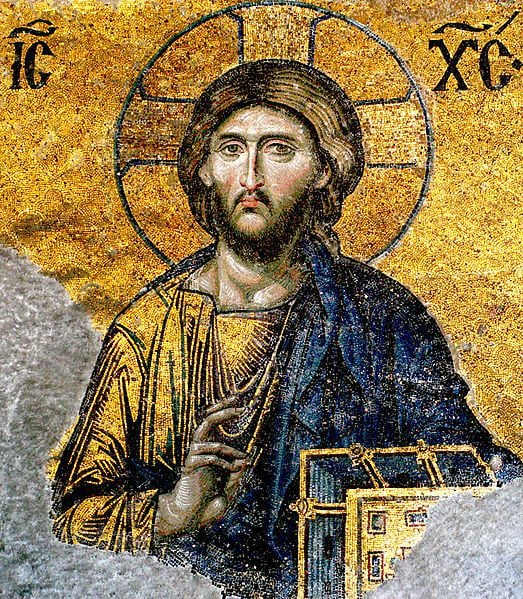
[see the Master List of all twelve installments]
Paolo Pasqualucci (signer of three of the endless reactionary-dominated “corrections” of Pope Francis), a Catholic and retired professor of philosophy of the law at the University of Perugia, Italy, wrote “‘Points of Rupture’ of the Second Vatican Council with the Tradition of the Church – A Synopsis” (4-13-18), hosted by the infamous reactionary site, One Peter Five. It’s an adaptation of the introduction to his book Unam Sanctam – A Study on Doctrinal Deviations in the Catholic Church of the 21st Century.
Pope Benedict XVI, writing as Cardinal Ratzinger, stated that the authority of Vatican II was identical to that of the Council of Trent:
It must be stated that Vatican II is upheld by the same authority as Vatican I and the Council of Trent, namely, the Pope and the College of Bishops in communion with him, and that also with regard to its contents, Vatican II is in the strictest continuity with both previous councils and incorporates their texts word for word in decisive points . . .
Whoever accepts Vatican II, as it has clearly expressed and understood itself, at the same time accepts the whole binding tradition of the Catholic Church, particularly also the two previous councils . . . It is likewise impossible to decide in favor of Trent and Vatican I but against Vatican II. Whoever denies Vatican II denies the authority that upholds the other two councils and thereby detaches them from their foundation. And this applies to the so-called ‘traditionalism,’ also in its extreme forms. Every partisan choice destroys the whole (the very history of the Church) which can exist only as an indivisible unity.
To defend the true tradition of the Church today means to defend the Council. It is our fault if we have at times provided a pretext (to the ‘right’ and ‘left’ alike) to view Vatican II as a ‘break’ and an abandonment of the tradition. There is, instead, a continuity that allows neither a return to the past nor a flight forward, neither anachronistic longings nor unjustified impatience. We must remain faithful to the today of the Church, not the yesterday or tomorrow. And this today of the Church is the documents of Vatican II, without reservations that amputate them and without arbitrariness that distorts them . . .
I see no future for a position that, out of principle, stubbornly renounces Vatican II. In fact in itself it is an illogical position. The point of departure for this tendency is, in fact, the strictest fidelity to the teaching particularly of Pius IX and Pius X and, still more fundamentally, of Vatican I and its definition of papal primacy. But why only popes up to Pius XII and not beyond? Is perhaps obedience to the Holy See divisible according to years or according to the nearness of a teaching to one’s own already-established convictions? (The Ratzinger Report, San Francisco: Ignatius, 1985, 28-29, 31)
For further basic information about the sublime authority of ecumenical councils and Vatican II in particular, see:
Conciliar Infallibility: Summary from Church Documents [6-5-98]
The Bible on Papal & Church Infallibility [5-16-06]
Authority and Infallibility of Councils (vs. Calvin #26) [8-25-09]
The Analogy of an Infallible Bible to an Infallible Church [11-6-05; rev. 7-25-15; published at National Catholic Register: 6-16-17]
“Reply to Calvin” #2: Infallible Church Authority [3-3-17]
“On Adhesion to the Second Vatican Council” (Msgr. Fernando Ocariz Braña, the current Prelate of Opus Dei, L’Osservatore Romano, 12-2-11; reprinted at Catholic Culture) [includes discussion of VCII supposedly being “only” a “pastoral council”]
Pope Benedict on “the hermeneutic of reform, of renewal within continuity” (12-22-05)
The words of Paolo Pasqualucci, from his article, noted above, will be in blue:
*****
1. It appears that the actual meaning attributed to the Pastoral Constitution Gaudium et Spes On the Church In the Modern World (GS) does not conform to the Tradition of the Church; it seems on the whole to be permeated with the spirit of the so-called “new Enlightenment.”
This is too vague and offers no particular argument or critique, so I can’t reply.
2. GS 22.2 affirms that by His Incarnation the Son of God “has united Himself in some fashion with every man,” an extraordinary affirmation, which seems to extend the Incarnation to each one of us, thereby divinizing man.
Dr. Pasqualucci appears to be unfamiliar with theosis or deification or divinization. What these words (synonyms) mean is summarized in the Catechism of the Catholic Church:
460 The Word became flesh to make us “partakers of the divine nature“:78 “For this is why the Word became man, and the Son of God became the Son of man: so that man, by entering into communion with the Word and thus receiving divine sonship, might become a son of God.”79 “For the Son of God became man so that we might become God.”80 “The only-begotten Son of God, wanting to make us sharers in his divinity, assumed our nature, so that he, made man, might make men gods.”81
Footnotes:
78 2 Pt 1:4.
79 St. Irenaeus, Adv. haeres. 3, 19, 1: PG 7/1, 939.
80 St. Athanasius, De inc. 54, 3: PG 25, 192B.
81 St. Thomas Aquinas, Opusc. 57, 1-4.
Here are the first three references in the footnotes:
2 Peter 1:4 (RSV) . . . you may escape from the corruption that is in the world because of passion, and become partakers of the divine nature.
1. But again, those who assert that He was simply a mere man, begotten by Joseph, remaining in the bondage of the old disobedience, are in a state of death having been not as yet joined to the Word of God the Father, nor receiving liberty through the Son, as He does Himself declare:
If the Son shall make you free, you shall be free indeed.John 8:36 But, being ignorant of Him who from the Virgin is Emmanuel, they are deprived of His gift, which is eternal life; Romans 6:23 and not receiving the incorruptible Word, they remain in mortal flesh, and are debtors to death, not obtaining the antidote of life. To whom the Word says, mentioning His own gift of grace:I said, You are all the sons of the Highest, and gods; but you shall die like men.He speaks undoubtedly these words to those who have not received the gift of adoption, but who despise the incarnation of the pure generation of the Word of God, defraud human nature of promotion into God, and prove themselves ungrateful to the Word of God, who became flesh for them. For it was for this end that the Word of God was made man, and He who was the Son of God became the Son of man, that man, having been taken into the Word, and receiving the adoption, might become the son of God. For by no other means could we have attained to incorruptibility and immortality, unless we had been united to incorruptibility and immortality. But how could we be joined to incorruptibility and immortality, unless, first, incorruptibility and immortality had become that which we also are, so that the corruptible might be swallowed up by incorruptibility, and the mortal by immortality, that we might receive the adoption of sons? (St. Irenaeus, Against Heresies, III, 19:1)For He was made man that we might be made God; and He manifested Himself by a body that we might receive the idea of the unseen Father; and He endured the insolence of men that we might inherit immortality. (St. Athanasius, On the Incarnation 54:3, PG 25:192B)
St. Thomas Aquinas stated:
Moreover, He has a particular agreement with human nature, since the Word is a concept of the eternal Wisdom, from Whom all man’s wisdom is derived. And hence man is perfected in wisdom (which is his proper perfection, as he is rational) by participating the Word of God, as the disciple is instructed by receiving the word of his master. Hence it is said (Sirach 1:5): “The Word of God on high is the fountain of wisdom.” And hence for the consummate perfection of man it was fitting that the very Word of God should be personally united to human nature. (ST III, q. 3. a. 8)
One of the reasons for the incarnation, according to St. Thomas, is for “the full participation of the Divinity, which is the true bliss of man and end of human life; and this is bestowed upon us by Christ’s humanity; for Augustine says in a sermon (xiii de Temp): ‘God was made man, that man might be made God‘ ” (ST III, q. 1 a. 2). St. Thomas also wrote:
Now the gift of grace surpasses every capability of created nature, since it is nothing short of a partaking of the Divine Nature, which exceeds every other nature. And thus it is impossible that any creature should cause grace. For it is as necessary that God alone should deify, bestowing a partaking of the Divine Nature by a participated likeness, as it is impossible that anything save fire should enkindle. (Summa Theologica, First Part of the Second Part, Q. 112: The Cause of Grace, Art. 1: Whether God Alone is the Cause of Grace)
That can hardly be anti-traditional and a “rupture” can it?: seeing that it is based on the Bible, St. Irenaeus, St. Augustine, St. Athanasius, and St. Thomas Aquinas. What more does one require? For more on the basics of theosis, see my papers:
Theosis and the Exalted Virgin Mary [7-11-04]
“In Him” An Expression of the Oneness of Theosis? [3-13-14]
Here now is the disputed section of Gaudium et Spes:
[section 22, 2nd paragraph] He Who is “the image of the invisible God” (Col. 1:15), (21) is Himself the perfect man. To the sons of Adam He restores the divine likeness which had been disfigured from the first sin onward. Since human nature as He assumed it was not annulled, (22) by that very fact it has been raised up to a divine dignity in our respect too. For by His incarnation the Son of God has united Himself in some fashion with every man. He worked with human hands, He thought with a human mind, acted by human choice (23) and loved with a human heart. Born of the Virgin Mary, He has truly been made one of us, like us in all things except sin. (24)
Footnotes:
21. Cf. 2 Cor. 4:4.
22. Cf. Second Council of Constantinople, canon 7: “The divine Word was not changed into a human nature, nor was a human nature absorbed by the Word.” Denzinger 219 (428); Cf. also Third Council of Constantinople: “For just as His most holy and immaculate human nature, though deified, was not destroyed (theotheisa ouk anerethe), but rather remained in its proper state and mode of being”: Denzinger 291 (556); Cf. Council of Chalcedon:” to be acknowledged in two natures, without confusion change, division, or separation.” Denzinger 148 (302).
23. Cf. Third Council of Constantinople: “and so His human will, though deified, is not destroyed”: Denzinger 291 (556).
24. Cf. Heb. 4:15.
I think it’s quite clear that the intended meaning here is in line with what has been presented above from Holy Tradition and the Bible. If “every man” is the “gripe within a gripe” then that is easily explained as referring to universal atonement. This is made clear in paragraph 5:
For, since Christ died for all men, (32: “Cf. Rom. 8:32.”) and since the ultimate vocation of man is in fact one, and divine, we ought to believe that the Holy Spirit in a manner known only to God offers to every man the possibility of being associated with this paschal mystery.
Holy Scripture itself often refers to “all men” or “the world,” etc., with regard to salvation, but we know (all relevant texts considered) that it is referring to universal atonement (i.e., a universal possibility or offer of salvation by His free grace), and not universalism (all people are saved):
Wisdom 16:12 For neither herb nor poultice cured them, but it was thy word, O Lord, which heals all men.
Luke 3:6 and all flesh shall see the salvation of God.
John 3:17 For God sent the Son into the world, not to condemn the world, but that the world might be saved through him. (cf. 4:42; 6:33; 6:51; 8:12; 9:5; 12:47; 2 Cor 5:19; 1 Jn 4:14)
John 12:32 and I, when I am lifted up from the earth, will draw all men to myself.
Romans 5:18 Then as one man’s trespass led to condemnation for all men, so one man’s act of righteousness leads to acquittal and life for all men.
Ephesians 3:9 and to make all men see what is the plan of the mystery hidden for ages in God who created all things; (cf. 1:9-10)
1 Timothy 2:3-6 . . . God our Savior, [4] who desires all men to be saved and to come to the knowledge of the truth. [5] For there is one God, and there is one mediator between God and men, the man Christ Jesus, [6] who gave himself as a ransom for all, the testimony to which was borne at the proper time.
1 Timothy 4:10 For to this end we toil and strive, because we have our hope set on the living God, who is the Savior of all men, especially of those who believe.
Titus 2:11 For the grace of God has appeared for the salvation of all men,
2 Peter 3:9 The Lord is not slow about his promise as some count slowness, but is forbearing toward you, not wishing that any should perish, but that all should reach repentance.
Hence, the objection vanishes.
***
Photo credit: Edal Anton Lefterov (3-31-06): Jesus Christ – detail from Deesis mosaic (13th c.), Hagia Sophia, Istanbul [Wikimedia Commons / Creative Commons Attribution-Share Alike 3.0 Unported license]













